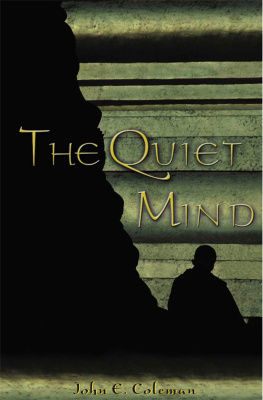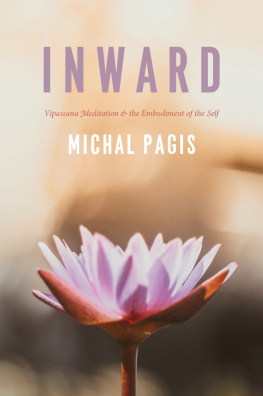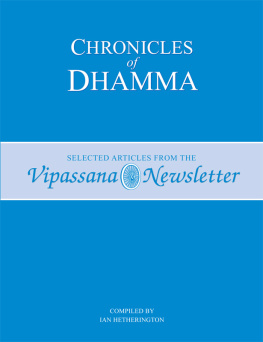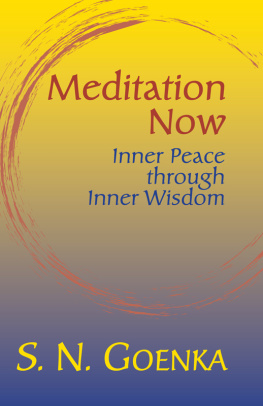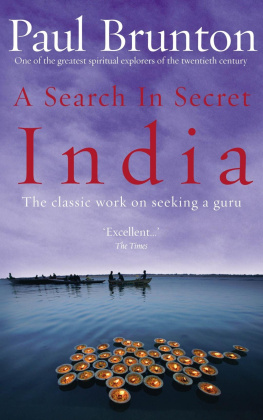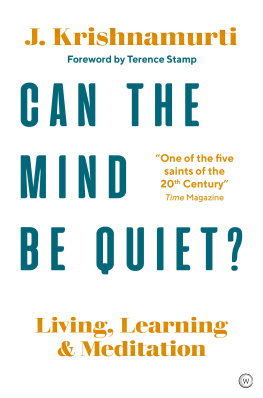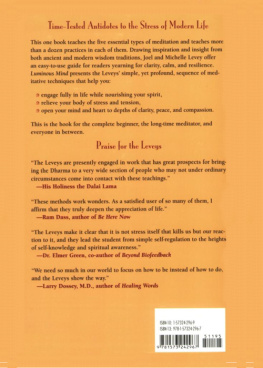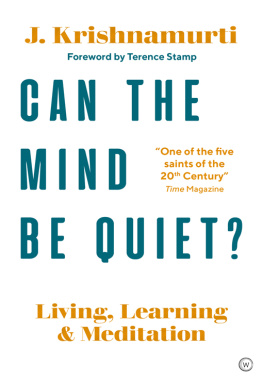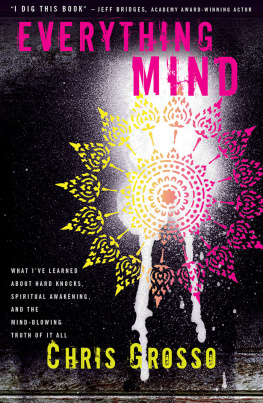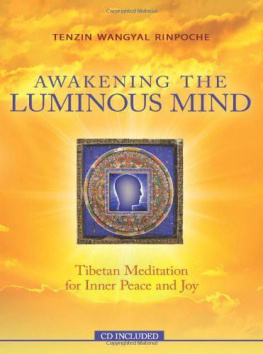Where the author was first introduced to Buddhist meditation.
Burmese government official and leading teacher of meditation, whose example inspired the author to go on trying
A twentieth-century saint? Krishnamurti caught in contemplative mood by the authors camera in the grounds of his college in the heart of the English countryside.
The third of the Three Wise Men from whom the author sought guidance in his quest
The eight-sided shrine at U Ba Khins International Meditation Centre where the search ended and the author discovered the supreme experience
Publishers Preface
Nearly thirty years have passed since the first edition of The Quiet Mind appeared in print. Many of the individuals encountered in the authors search are no longer with us. Why then reissue this book, when many of its potential readers were not even born at the time of the events portrayed?
The search for a quiet mind is a universal search. The tools for the search are universal tools, and the answers are universal answers.
Since this book was originally published, there seems to have been a flood tide of interest in the search. The Quiet Mind remains a testament to this search, and offers the hope and the inspiration that the goal can be reached.
This second edition expands on the original edition with the addition of a postscript, which tells the story of the authors experience since the events in the book, and describes how the tools for finding a quiet mind have spread to the West since the first edition.
A note on terminology
Many of the terms used by the author come from the rich complex of languages of the Indian subcontinent. Pli is used in the Theravdin, or southern Buddhist tradition of the authors primary teachers. For readability however, the author has used the more familiar Sanskrit forms for words such as karma, rather than the Pli kamma, and nirvana rather than the Pli nibbna. Less common words, such as sla, anatt, and dukkha have been left in Pli. When quoting teachers directly, the original Pli language has been left unchanged.
Also to be noted are two distinct uses of the phrase transcendental meditation. When used to refer specifically to the technique taught by Maharishi Mahesh Yogi, the words are capitalized; when used to refer in general to meditation whose goal is to transcend ordinary reality, the phrase is left in small letters.
Since the writing of The Quiet Mind, the name of Burma has changed to Myanmar, and its capital, formerly Rangoon, is now known as Yangon. The original usages have not been changed for this edition.
Introduction
A Question of Conflict
I N all life there is conflict. A plant has to thrust its way through the soil to reach daylight, a newborn baby has to yell to fill its lungs with oxygen. A wild animal must kill to eat or go hungry: either way there is conflict for the animal. As human beings we meet it every day and in everything we do, for conflict is part of living.
And as humans we are very accomplished at providing ourselves with various forms of relaxation or diversion to help us ease up on the pressure.
Whatever form our relaxation takes we ask one of two things from it. If life has been hectic we want peace and quiet, if our routine is dull and uneventful we demand to be taken out of ourselves. We dont have to look far to satisfy these commonplace requirements, and we are not overanxious to notice just how temporary are their revitalizing effects.
What many people today want to know, and what I was determined to find out, is: can there be a condition, a pool of quiet where the active, restless mind can completely switch off, opt out of the conflict, and still remain purposeful, wholesome, communicative and creative?
In this report I have recorded my search for this condition. I have recalled the circumstances which set me off on the search, traced its progress and described its results.

Part of the mystery of the Far East lies in the fact that in that part of the world the kind of questions to which I wanted answers do not bring raised eyebrows and impatient protests of nonsense. Meditation, strange religious practices designed to free the mind, even faith in occult powers which throw light on the more obscure mental processes, are not dismissed as unfruitful areas of research.
On the contrary, I found the outlook of the people and their approach to daily life provided just the right atmosphere for my search and, probably because of the novelty of a Westerner showing an interest, many wise and respected people helped.
Not only was the atmosphere right and the people helpful, I had plenty of opportunity to follow my inquiries. My business in the Far East was import-export or, rather, that was the name it went under. I was employed as an espionage agent by the U.S. Central Intelligence Agency.
While stationed in Bangkok under my business cover I was assigned to the Thai Ministry of the Interior as an advisor to the Thai Police Department on national security and antisubversive matters. My duties brought me into close contact with a wide range of people including senior government officials, members of royalty, civic leaders, educators, the social elite, religious leaders, professional and business people, labourers and peasants. Altogether a pretty representative section of the community, which gave me an excellent and valuable insight into Thai life and mentality.
And some of my duties involved considerable travel both inside Thailand and throughout the Far East and South East Asia, with the occasional trip to Washington for training and debriefing.

